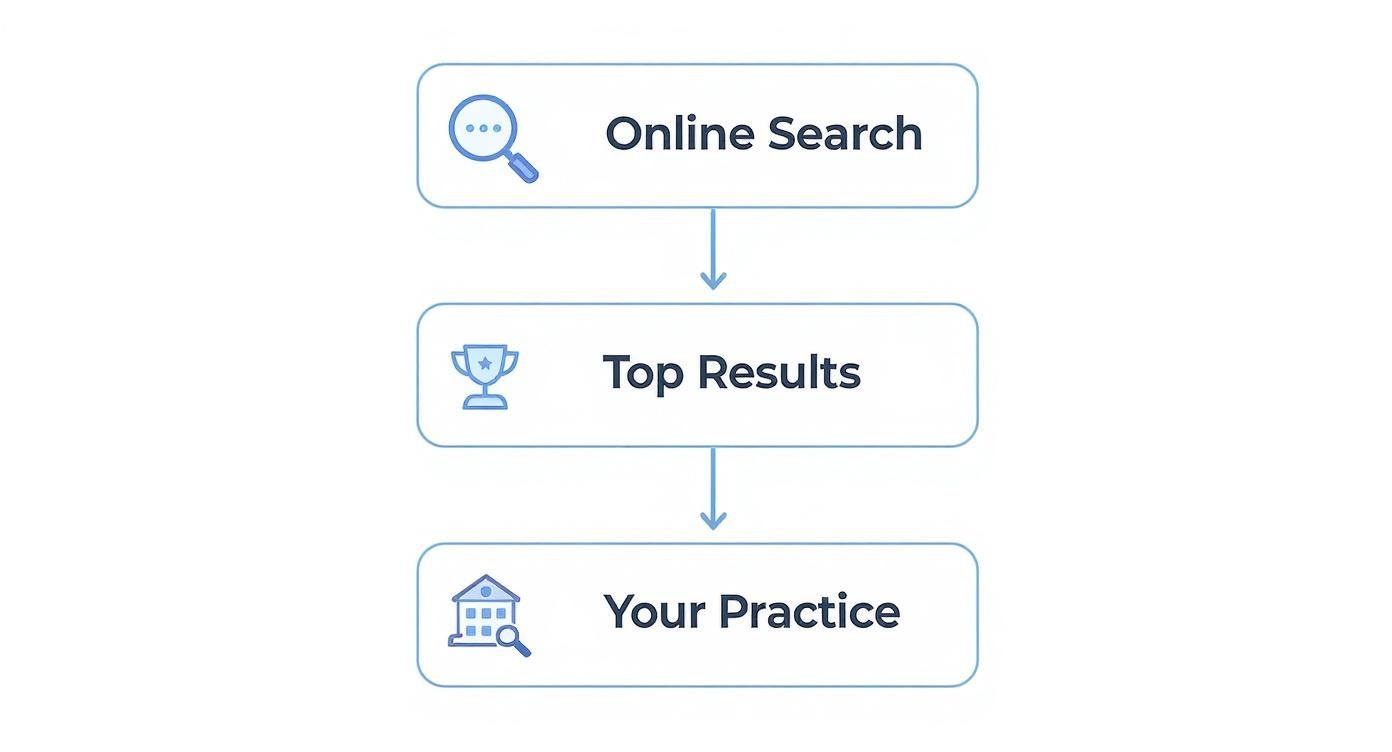If new patients can't find your practice online, it's hard to grow. Think of SEO services for physicians as a clear, digital sign pointing right to your clinic's front door, making you the first choice local patients see when they search for care.
Without a solid online presence, you're invisible to the majority of people who start their search for a doctor on Google.
In Short: A smart SEO strategy ensures that when local patients search for medical help, your practice is the first one they find.
Why SEO Is Essential for Your Medical Practice
How patients find doctors has completely changed. Relying on old methods like word-of-mouth referrals or a Yellow Pages listing is no longer enough. Today, when someone feels sick or needs a specialist, their first move is to search online.
This makes a strong digital strategy crucial for growing your practice. An unoptimized website is like having a top-of-the-line clinic tucked away in an unmarked alley. You could be the best doctor in the city, but your patient numbers won't reflect it.
The Modern Patient Journey Starts on Google
The data is clear. A huge number of patients use search engines before making an appointment. Around 65% of patients begin their hunt for a new doctor online.
You need to be on the first page of search results. Why? Because a staggering 81% of all clicks go to the top five organic search results. If you're not there, you're missing out on new patients. You can learn more about the latest healthcare SEO trends over at Tebra.com.
This presents a massive opportunity. Investing in SEO can create a reliable flow of new patients by putting your practice in front of them the moment they need you.
Connect with Patients Ready to Book an Appointment
SEO connects you with people who are actively looking to schedule an appointment. When someone searches "cardiologist near me" or "best dermatologist in [Your City]," they have a real, immediate need. A good SEO strategy makes sure your practice is the answer they find.
Optimizing for these specific, local searches establishes your practice as the go-to choice in your area. It's the most direct way to reach patients who are ready to make a call. This guide provides a clear roadmap for using SEO to grow your practice. It's a key part of any successful doctor marketing plan.
Understanding the Core Parts of Medical SEO
SEO can sound complicated, but it breaks down into a few simple concepts. For a physician, it’s about organizing your digital practice so it’s easy for both patients and search engines to find and understand.
It's helpful to know where SEO fits in your overall marketing. For a good overview, start with understanding the key differences between paid and organic search. We’re focused on organic search—the strategy that builds long-term trust and visibility without paying for every click.
It all comes down to the three pillars of SEO.
The Three Pillars of SEO for Physicians
| SEO Pillar | What It Is for Your Practice | A Simple Example |
|---|---|---|
| On-Page SEO | Everything on your website that tells patients and Google what you do. It's your digital signage. | Creating a detailed web page for a specific service like "ACL Tear Treatment in Dallas." |
| Technical SEO | The behind-the-scenes foundation of your website. Is it fast, secure, and easy to use on a phone? | Making sure your website loads in under 3 seconds on a mobile device so patients don't leave. |
| Off-Page SEO | Your practice's reputation across the web, based on what other trusted sources say about you. | Getting a link to your practice's blog from a reputable local health website. |
Each pillar supports the others. Together, they create a strong foundation that helps new patients find you.
On-Page SEO: Your Website's Content
On-Page SEO covers everything you do directly on your own website to make it clear and helpful for both search engines and patients. Think of it like setting up your physical clinic. The waiting room is clean, the signs are clear, and the information is useful.
This is where you improve your website's content and structure. Key elements include:
- Service Pages: Build dedicated pages for each condition or treatment you offer, like "Rosacea Management" or "Sports Physicals."
- Doctor Bios: Write detailed bios that showcase your care philosophy and experience to build trust.
- Keywords: Use the exact phrases patients search for, like "best pediatrician in Austin" or "non-surgical spine doctor near me."
Good On-Page SEO makes your content highly relevant. It answers a patient’s question directly, establishing your expertise from their first click.
Technical SEO: Your Website's Foundation
Technical SEO is your website's core infrastructure—the parts you don't see but that are critical for a good user experience. It ensures search engines can easily find and understand your site. It also ensures visitors have a smooth, frustration-free visit.
In Short: A technically sound website is fast, secure, and works perfectly on a smartphone.
A few key pieces of technical SEO include:
- Mobile-Friendliness: Most patients search on their phones. Your site must work great on a small screen.
- Site Speed: Pages need to load almost instantly. A slow website is a top reason people leave and go to a competitor.
- Security: Using HTTPS is essential. It protects patient privacy and shows Google your site is trustworthy.
Without a strong technical foundation, your other marketing efforts won't be as effective.
Off-Page SEO: Your Reputation Around the Web
Off-Page SEO is everything that happens away from your website to build its authority and reputation online. It’s the digital version of your professional standing in the medical community.
The biggest factor here is backlinks. When another respected website links to yours, it acts as a vote of confidence. It tells Google your practice is a credible source of information.
This diagram shows how a patient's search connects them to a top-ranking practice.

As you can see, appearing in top search results is the critical bridge between a patient's problem and your solution. All three SEO pillars work together to build and maintain that bridge.
How to Dominate Local Search and Attract Patients

For physicians, winning locally is what matters most. While ranking for broad medical topics is good, connecting with patients in your community is the real goal. Local SEO is your most powerful tool for attracting new patients.
When someone searches "orthopedist near me," they are looking for an appointment, not a general article. Your goal is to be the first, most trusted name they see.
The foundation of local SEO is your Google Business Profile (GBP). It's your digital front door. For some practices, up to 70% of organic traffic comes directly from their GBP, often without the user ever clicking through to the website.
Your Google Business Profile: Your Digital Front Door
Your Google Business Profile is the box that appears in Google Maps and on the side of the search results page. For many patients, it's their first impression of your practice.
First, claim and verify a profile for your practice and for each individual physician. Google encourages separate profiles for each doctor to maximize visibility.
Then, fill out every single section completely. The more detail you provide, the more Google will trust your profile and show it to people.
- Services: List every treatment, procedure, and condition you handle.
- Insurance: Make it easy for patients to see which insurance you accept.
- Photos: Post high-quality pictures of your office, staff, and the building's exterior.
A complete profile signals authority and makes it easy for patients to choose you.
Why NAP Consistency Is So Important
A key rule in local SEO is maintaining consistent NAP data—your Name, Address, and Phone number. This information must be identical everywhere it appears online.
Why do small details matter? Inconsistencies confuse search engines and lower their trust in your business information.
In Short: Perfect NAP consistency across the web tells Google your practice is legitimate and reliable, which is a major local ranking factor.
Use your Google Business Profile as the single source of truth, and ensure all other online directories match it exactly.
Expand Your Reach with Medical Directories
With your Google Business Profile set up, get your practice listed on other key online directories. This reinforces your local authority and earns you valuable backlinks.
Focus on both general and healthcare-specific sites.
- General Directories: Don't forget major platforms like Yelp and Apple Maps.
- Healthcare Directories: It is critical to have a strong presence on sites like Healthgrades, Vitals.com, and WebMD.
Being listed on trusted medical sites signals to Google that you are a legitimate provider in your area. This is a core part of any smart local maps SEO strategy.
The Power of Patient Reviews
Reviews are the social proof that drives modern healthcare choices. A steady flow of new, positive reviews often convinces a patient to call your office over a competitor's.
You need a system to encourage feedback.
- Automate the Request. Use a simple text or email to ask patients for a review after their appointment.
- Make It Easy. Provide a direct link to your Google review page.
- Respond to All Reviews. Thank people for positive reviews and respond professionally to any negative feedback. This shows you're listening and you care.
Actively managing your reputation builds trust that attracts new patients and boosts your local search rankings.
Creating Content That Builds Patient Trust

For a medical practice, content is not just about keywords. It's about earning the trust of someone who is worried or looking for clear answers. Your SEO services for physicians must focus on building genuine authority.
Google is very careful with health topics. It uses a quality checklist called E-E-A-T, which stands for Experience, Expertise, Authoritativeness, and Trustworthiness.
Think of E-E-A-T as Google’s way of asking, "Is this information reliable enough for someone's health?" Your content must answer with a confident "yes."
Turning E-E-A-T Into Helpful Content
How do you create E-E-A-T content? It's about breaking down complex topics into simple, reassuring language. Your website should be a tool that empowers patients, not a textbook that intimidates them.
Here are a few ways to build that trust:
- Detailed Service Pages: Don't just list conditions. Create a dedicated page for each one. Explain the causes, symptoms, and treatment options in plain English.
- Authentic Doctor Bios: Go beyond your credentials. Share your philosophy of care. This helps build a real human connection.
- A Genuinely Helpful Blog: Think about the questions you answer all day in your office. Turn those answers into articles.
This approach proves your expertise to both people and search engines simultaneously.
Answering Questions Patients Actually Ask
One of the best ways to build trust is to directly answer the questions people are typing into Google. Creating an FAQ section or blog posts around these queries is a game-changer.
In Short: Your website's content should feel like the conversations you have with patients. When you answer their questions online, you start building a trusted relationship before they even meet you.
For example, someone searching for "treatment for herniated disc" is looking for solutions. Your website needs to provide clear, helpful information about their options at that exact moment.
People Also Ask
What is E-E-A-T in SEO?
E-E-A-T is Google's quality rating framework. It stands for Experience, Expertise, Authoritativeness, and Trustworthiness. For a physician, this means your content must be medically accurate, written or reviewed by a medical expert (you), and published on a professional, secure website to rank well.
Why is content important for doctors?
Content is how you build trust and authority online before a patient ever meets you. Most people start their search for a doctor on Google. High-quality content that answers their questions makes your practice the clear, credible choice and leads to more qualified patient calls.
What should I write about on my medical website?
Write about what your patients care about. Start by creating detailed pages for every condition you treat and procedure you perform. Then, write blog posts that answer common questions, offer wellness tips, and introduce your staff and care philosophy. This makes your practice feel both authoritative and approachable.
A great content strategy is about patient education. It gives someone the confidence they need to pick up the phone and trust you with their care.
How to Measure Your SEO Success and ROI

If you're investing in SEO services for physicians, how do you know if it's working? Measuring success comes down to a few key numbers that directly impact your practice’s bottom line.
The goal isn't just to get clicks; it's to get the right clicks from local people who need your help and are ready to book an appointment. SEO is not an expense; it's a predictable engine for patient growth.
What Metrics Actually Matter for Your Practice
Focus on these three core indicators to measure progress.
- Organic Traffic: The number of people finding your website through a regular, non-paid Google search. A steady increase means more potential patients are discovering you.
- Keyword Rankings: Where your website appears for important search terms. Climbing the ranks for phrases like "orthopedist in [Your City]" is a direct sign of growing visibility.
- Conversions: This is the most important one. A conversion is any meaningful action a visitor takes, like calling your office or filling out an appointment request form. This is where online traffic becomes real-world patients.
In Short: Success is a consistent increase in local traffic that leads to a measurable rise in new patient inquiries and booked appointments.
Translating SEO Metrics into ROI
Connecting these numbers to a return on investment (ROI) is simple. You need to know the average value of a new patient and your website's conversion rate.
Here’s a quick example for a local dermatology clinic:
- Website traffic increases by 300 qualified local visitors per month.
- The site has a 5% conversion rate, resulting in 15 new patient leads (300 x 0.05).
- The front desk books one-third of those leads, which equals 5 new patients each month from SEO.
- If the average lifetime value of a new patient is $1,500, those 5 patients bring in $7,500 in new revenue that month.
When you track these numbers, you can draw a straight line from your SEO campaign to your practice's growth.
The Big Picture on Digital Investment
The shift to digital is the new standard in healthcare. Over 72% of all media advertising spend in healthcare is now digital. Large physician groups often invest $750 to $1,500 monthly on SEO alone because they see it as a direct channel for patient acquisition. You can find more healthcare marketing statistics to see how practices are allocating their budgets.
Measuring SEO success is about tracking the full journey—from a Google search to a new patient walking into your exam room. With clear metrics, you can confidently invest in a strategy that delivers predictable results.
Choosing the Right SEO Partner for Your Practice
https://www.youtube.com/embed/vaxXNpxNWl0
Picking an SEO agency is a critical decision for your practice's growth. The right partner can build a predictable engine for new appointments. The wrong one can waste your budget.
Not all SEO is the same. An agency that works for a plumber probably doesn't understand healthcare marketing. You need a team that understands the ethical and regulatory rules, like HIPAA compliance, and knows how to build trust with patients.
Key Questions to Ask Any Potential Agency
Before signing a contract, ask some tough questions.
- Do you have experience in healthcare? Ask for specifics, especially if they've worked with practices in your specialty.
- Can I see case studies from other doctors? They should be able to show real-world examples of how they've helped physicians grow.
- How do you create content? Ensure they understand Google's E-E-A-T guidelines and the need for medically accurate content.
- What do your reports show? Ask for a sample report. It should focus on patient leads and appointment requests, not just traffic.
Red Flags to Watch Out For
Knowing what to avoid is just as important. Some agencies use shady tactics that can get your website penalized by Google.
In Short: A great SEO partner is transparent, data-driven, and focused on the long-term health of your practice, not on flashy promises.
Here are a few red flags:
-
Guarantees of "#1 Rankings"
No one can guarantee a #1 spot on Google. SEO is a competitive, constantly changing field. Anyone making that promise is being dishonest. -
A "Secret Sauce" or Vague Strategy
A true professional will explain their strategy in plain English. If they are vague or use a lot of jargon, they may be hiding a lack of substance. -
No Focus on Conversions
Traffic and rankings are nice, but they don't pay the bills. The conversation should always come back to how their work will generate new patient inquiries. While SEO is a long-term play, it's good to know the differences between SEO and PPC for doctor's offices to set the right expectations.
Taking the time to vet your options will lead to a more profitable and successful partnership.
Got Questions About SEO for Your Practice?
We hear the same questions from physicians all the time. Here are answers to what's likely on your mind when considering SEO services for your medical practice.
How long until I see new patients from SEO?
SEO isn't instant. While you might see positive movement in the first few months, significant results—like a noticeable increase in patient calls—typically start to appear around the 6 to 12-month mark. SEO is a long-term strategy that builds a sustainable stream of new patients over time.
Can I do SEO myself?
You can handle some basics, like updating your Google Business Profile. However, medical SEO is a full-time discipline that requires expertise in technical issues, content strategy, and authority building. For a busy physician, the time commitment is often too great. Partnering with an expert usually gets better results, faster.
What is a realistic budget for physician SEO?
Costs vary based on your location, specialty, and local competition. For a smaller practice in a less crowded market, a budget of $750 to $1,500 per month is a reasonable starting point. A specialist in a major city will likely need a more aggressive investment. Think of it as an investment in patient acquisition, not just a marketing expense.
Does SEO comply with HIPAA?
Yes, as long as it’s managed by a team that understands healthcare regulations. A marketing agency specializing in healthcare will have HIPAA compliance built into its processes. Your SEO strategy focuses on getting patients to find your public website and never involves handling Protected Health Information (PHI).
Ready to turn your website into your most reliable source of new patients? The team at Clicks Geek builds custom SEO strategies that help physicians own their local market and achieve predictable, consistent growth. Find out how we can help your practice thrive.
Is Your Business Ranking in Google Maps?
Turn Google Maps into a Lead Engine w/ Clicks Geek’s AI-powered local SEO. 3,000+ clients served. Our proprietary, fully done-for-you Maps SEO system handles everything—keyword targeting, local optimization, content, reviews, and ranking strategy—automatically.






